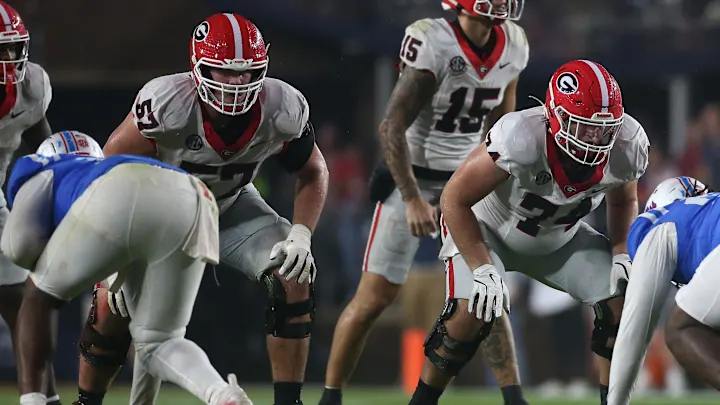Forging the Path Forward: Offensive Line Uncertainty Looms Large for Georgia Bulldogs Ahead of the 2025 Campaign
The Georgia Bulldogs, a program that has become synonymous with elite talent, punishing physicality, and championship contention, find themselves at a critical juncture as they prepare for the 2025 college football season. While the expectations in Athens remain sky-high, CBS Sports has pinpointed a specific area that demands immediate and effective attention: the offensive line. This unit, historically a bedrock of Georgia’s success, faces significant uncertainty, and how Kirby Smart and his staff address these questions will be paramount to the Bulldogs’ aspirations for another national title run.
The offensive line, often heralded as the engine of any successful football team, is undergoing a substantial overhaul for the Bulldogs. The departure of four starters from last season’s unit creates a void that cannot simply be filled by raw talent alone. While Georgia’s recruiting prowess ensures a continuous influx of highly rated prospects, the challenge lies in coalescing these individual talents into a cohesive and dominant five-man front. The transition from high school standout to SEC trench warrior is steep, and the learning curve is often unforgiving. Experience, communication, and a seamless understanding of assignments are vital components of offensive line play, and these are precisely what the Bulldogs will be seeking to cultivate in a relatively short timeframe.
This offensive line quandary is further magnified by the presence of a first-year starting quarterback. While the identity of Georgia’s signal-caller for 2025 is still being solidified, the fact remains that whoever takes the snaps will be doing so with a new group protecting them. A young quarterback, regardless of their individual talent, relies heavily on a stable and impenetrable pocket, and a consistent run game to alleviate pressure and allow them to settle into their rhythm. If the offensive line struggles to provide either of these, the development of the new quarterback could be hindered, and the entire offensive scheme could be compromised. Play-caller Mike Bobo’s ability to trust his offensive line, particularly at the tackle spots with players like Monroe Freeling and Earnest Greene, will dictate the offensive ceiling. Without reliable protection and consistent push up front, the Bulldogs’ playbook may become limited, forcing them into predictable situations that even the most talented skill players would struggle to overcome against the nation’s top defenses.
The intricacies of offensive line play extend beyond simply blocking. It’s about recognizing defensive schemes, making pre-snap adjustments, executing double-teams, and sustaining blocks through the whistle. These are skills that are honed through countless reps in practice and, more importantly, through live-game action. The lack of collective game experience among the projected starters and key rotational players presents a genuine concern. While spring practice offers a valuable opportunity for evaluation and development, it’s a far cry from the intensity and pressure of an SEC opener. The real test for this unit will come in the crucible of early-season matchups against formidable opponents, where every missed assignment or late reaction can have significant consequences.
Furthermore, the physicality that has defined Georgia’s championship teams starts at the line of scrimmage. The ability to run the ball effectively, control the clock, and wear down opposing defenses has been a hallmark of Kirby Smart’s program. If the offensive line isn’t consistently generating movement at the point of attack, the Bulldogs’ ground game, which has been a primary weapon, could falter. This would place an undue burden on the passing game and the new quarterback, potentially leading to a more one-dimensional offense that is easier for elite defensive coordinators to scheme against. The ripple effect of a struggling offensive line can be felt across the entire offensive unit, from the running backs who need holes to hit, to the wide receivers who rely on extended plays for routes to develop.
The staff’s emphasis on recruiting highly-rated linemen in recent cycles offers a glimmer of hope. Players like Daniel Calhoun, who possesses immense potential, represent the future of the unit. However, banking on immediate, elite production from true freshmen or redshirt freshmen in such critical roles is a risky proposition, even for a program with Georgia’s developmental track record. The integration of these young talents with returning players and their rapid ascent to starting caliber will be a testament to the coaching staff’s ability to accelerate their development. This isn’t just about physical conditioning; it’s about mental fortitude, understanding complex schemes, and developing the trust and camaraderie necessary for an offensive line to function as a single, cohesive unit.
Beyond the immediate concerns, the long-term sustainability of offensive line dominance for Georgia hinges on continuous player development and a robust pipeline of talent. While the recruiting has been stellar, translating that potential into consistent on-field performance is the true measure of success. This requires dedicated coaching, strength and conditioning programs tailored to linemen, and a culture that prioritizes the often-unheralded work of the offensive front. The Bulldogs have traditionally excelled in this regard, but the 2025 season will serve as a significant test of their ability to maintain that standard in the face of substantial personnel turnover.
Ultimately, while Georgia possesses a wealth of talent at other positions and a coaching staff widely regarded as among the best in the nation, the offensive line stands as the most critical variable heading into 2025. How quickly and effectively they can address the uncertainty in the trenches, develop their young talent, and forge a cohesive unit will likely be the determining factor in whether the Georgia Bulldogs once again find themselves competing for college football’s ultimate prize. The margin for error in the SEC, particularly with an expanded playoff on the horizon, is razor-thin, and any perceived weakness at the line of scrimmage will be relentlessly attacked by opponents. The Bulldogs’ summer and fall camp will undoubtedly be heavily focused on solidifying this vital unit, understanding that their championship aspirations hinge on it.



